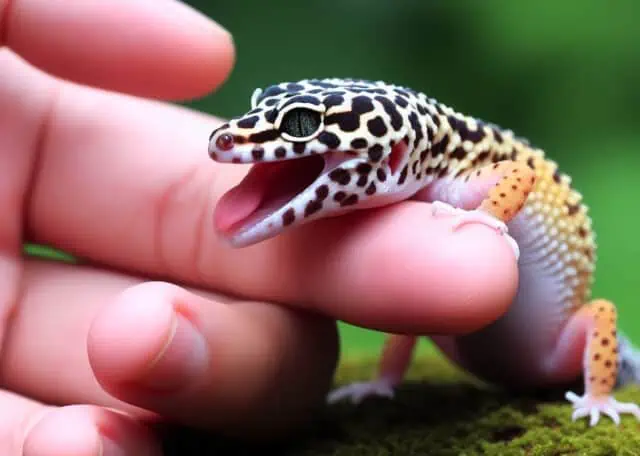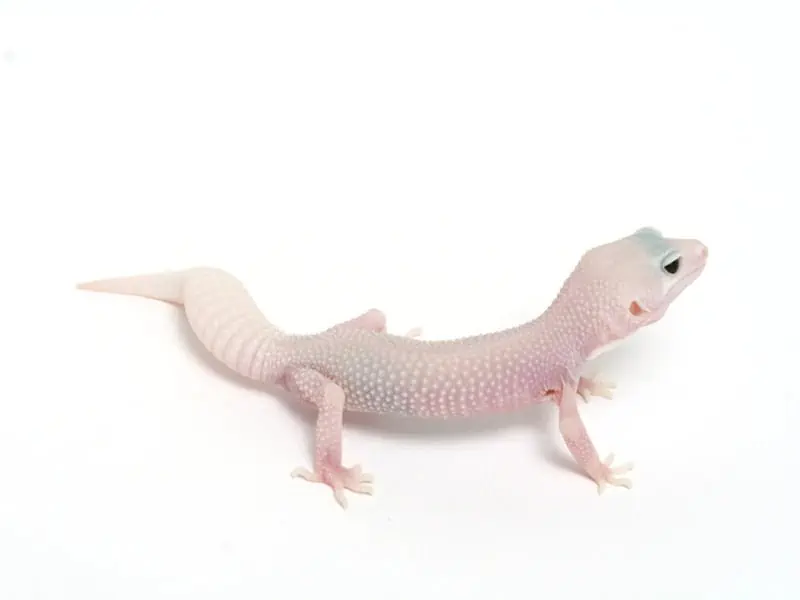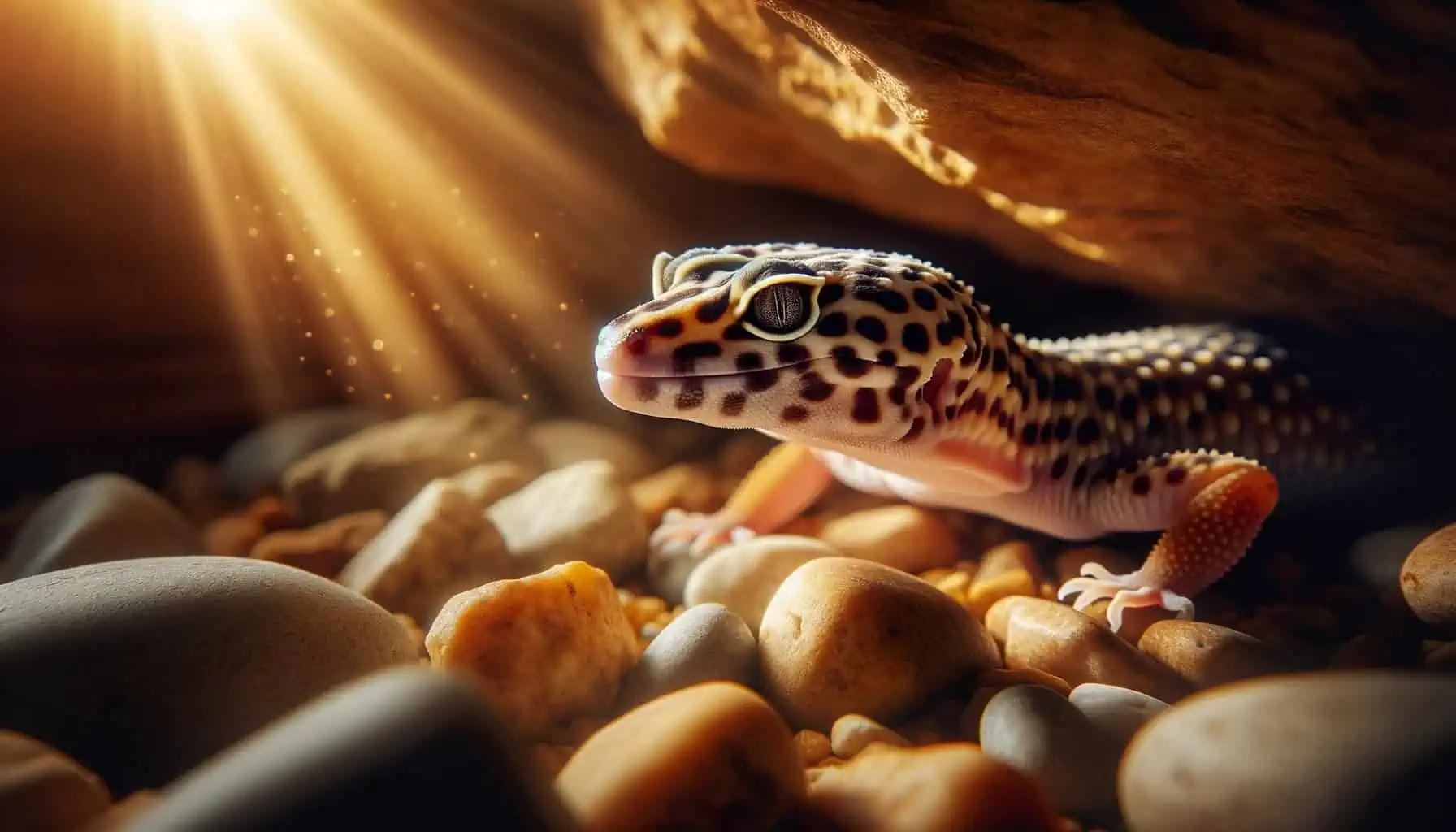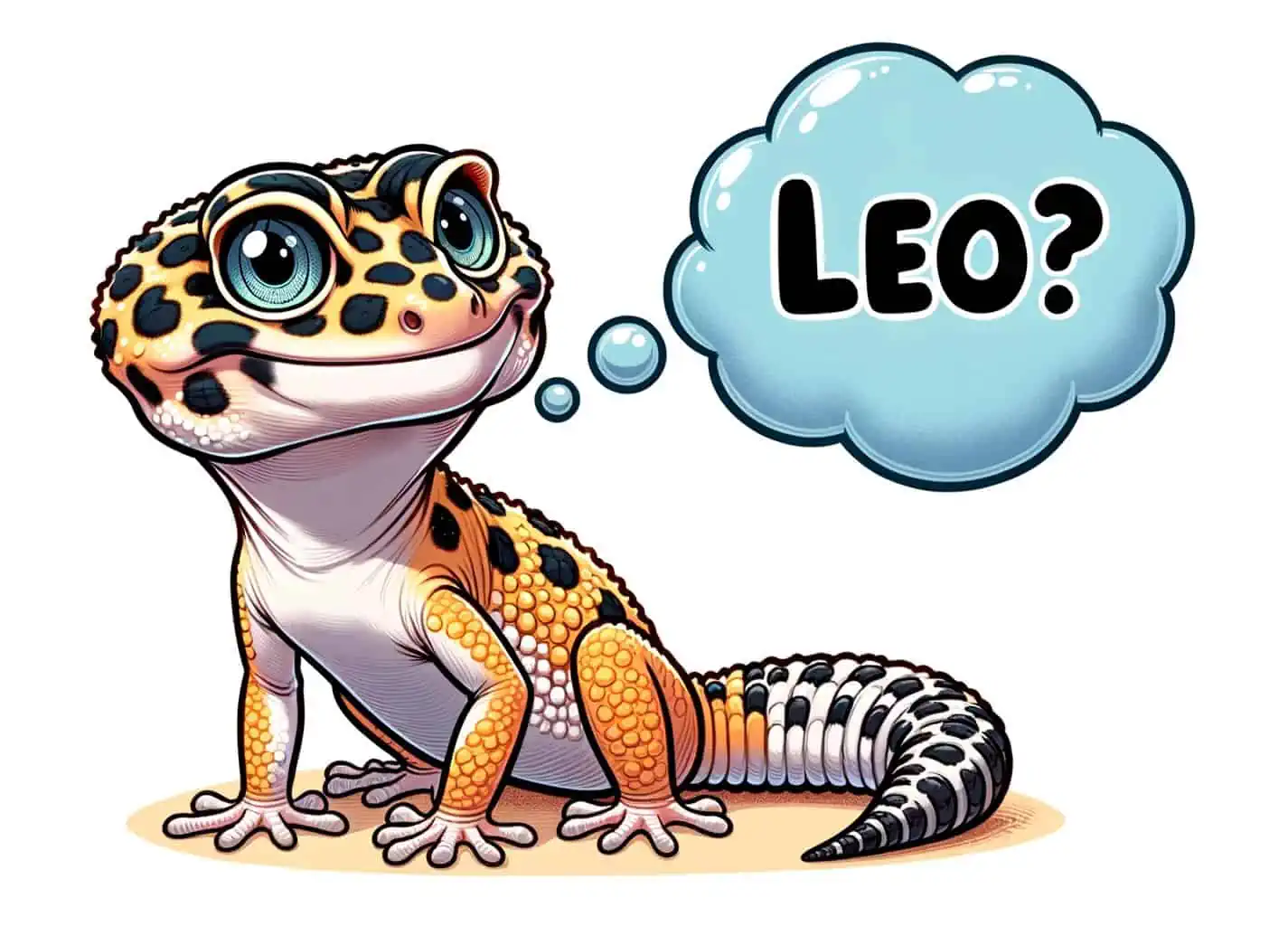No, leopard geckos are not poisonous. These small reptiles are harmless to humans. They have no venom or toxins. While they might look exotic with their vibrant colors and patterns, they pose no danger from a poisonous standpoint. So, if you’re considering one as a pet, rest easy on this front.
Leopard Gecko Toxicity: Leopard geckos are not poisonous. However, their bites can introduce bacteria, leading to potential infections.
Bites to Pets: While leopard geckos aren’t toxic to dogs or cats, they can carry parasites like liver flukes that pose serious health threats to cats. It’s essential to keep them separated.
Causes of Bites: Main reasons geckos might bite include feeling threatened, territorial behavior, or mishandling. Always handle with care and respect their space.
Bite Symptoms & Care: A bite might result in redness, swelling, and itching. The severity can vary based on skin sensitivity and gecko hygiene. Proper wound care is essential to prevent infections.
Medical Attention: Always consult with a healthcare professional if bite symptoms worsen or persist. They can assess the wound and recommend treatments as necessary.
Are Leopard Geckos Poisonous to Humans?
Leopard geckos, as reiterated, are not poisonous. A bite from these creatures might surprise you, but it isn’t filled with venom. However, it’s not the poison you should be concerned about but the potential for infection. Bites from leopard geckos, like any small injury, can introduce bacteria to your skin.
The bacterial infection risk shouldn’t be taken lightly. While a bite might not be large, neglecting proper wound care can turn a minor injury into a significant concern. It’s crucial to clean the wound thoroughly and maintain good hygiene. This will prevent most infections.
What signs should you watch out for? Common symptoms of infection from a bite include redness, swelling, and the formation of pus. If you notice any of these symptoms, it’s essential to pay attention.
Lastly, while most bites heal without complications, if symptoms worsen or don’t improve, seeking medical attention is paramount. It ensures that any infection is dealt with promptly, minimizing potential complications.
Are Leopard Geckos Poisonous to Dogs?
Many pet owners who love both reptiles and canines often wonder about the compatibility of these animals. Specifically, they ask, “Are leopard geckos poisonous to dogs?” Here’s the scoop: leopard geckos are not poisonous to dogs. If, in a curious moment, a dog were to ingest a gecko, it’s unlikely to cause any severe harm.
However, it’s not the idea of poison that should be the main concern. Keeping geckos out of a dog’s sight is a wise move. Dogs, especially those that are unpredictable or highly excitable, might see the tiny gecko as a plaything. This can lead to distress for the gecko and, possibly, an upset tummy for the dog.
There are several reasons to keep these pets apart. Dogs, with their playful nature, might inadvertently harm the fragile gecko. Conversely, any remnants or bacteria from the gecko might unsettle a dog’s stomach. In essence, while there’s no poison to worry about, there are potential risks that warrant keeping these species separate.
Are Leopard Geckos Poisonous to Cats?
For feline enthusiasts who might also have a penchant for reptiles, a pressing question often arises, whether leopard geckos are harmful to cats. While leopard geckos themselves are not poisonous to cats, there are potential risks involved when the two come into contact.
A significant concern is the presence of liver flukes. These are parasites that some geckos might carry. If a curious cat were to ingest a gecko, these liver flukes could transfer and pose serious health concerns. In the worst-case scenario, liver flukes can lead to severe illnesses and even death in cats.
Given these risks, it’s clear that even if leopard geckos aren’t venomous, it’s in the best interest of both pets to keep them apart. Ensuring that your cat doesn’t have access to your gecko will help in maintaining the health and safety of both animals.
Symptoms of a Bite from a Leopard Gecko
Leopard geckos are captivating creatures that many enthusiasts adore. While they’re generally considered docile, bites can occasionally occur, especially if they feel threatened or mishandled.
Human Skin Reaction to the Bite
The human skin reaction to a bite from a leopard gecko can vary based on several factors. Typically, one might observe immediate symptoms like redness, swelling, and itching at the site of the bite. While these geckos aren’t poisonous, the physical puncture from their bite can lead to such reactions.
Several elements play a role in determining the severity of the skin’s reaction. An individual’s skin sensitivity can make some people more prone to pronounced reactions than others. Moreover, the hygiene of the gecko can influence the outcome. If a gecko’s mouth houses bacteria, it can introduce it into the wound, possibly leading to an infection or heightened skin response.
In some rare cases, individuals might also exhibit allergic reactions to the bite. This could manifest as more severe swelling, extended redness, or even hives. It’s essential to monitor the bite site closely and consult with a medical professional if any unexpected or severe symptoms develop.
Is Medical Attention Necessary?
While a bite from a leopard gecko might seem minor, the importance of seeking medical attention shouldn’t be overlooked. These small punctures can introduce bacteria into the wound, leading to potential infections that might have long-term implications if not addressed promptly.
The risks associated with neglecting a leopard gecko bite can be significant. Without proper treatment, an untreated bite can escalate into a bacterial infection, causing symptoms far more severe than the initial bite’s discomfort. Complications can range from localized infections to more widespread issues if the bacteria enter the bloodstream.
Treating a Bite from a Leopard Gecko
Leopard geckos, though primarily docile creatures, can occasionally bite. One significant concern with any bite is the potential for infection. The mouths of many animals, leopard geckos included, can harbor bacteria. When they bite, there’s a chance these bacteria are transferred to the wound, escalating the bacterial infection risk.
While leopard geckos aren’t inherently venomous or toxic, the types of bacteria present in their mouths can sometimes be harmful if introduced into a wound. These bacteria might not pose any harm to the gecko itself, but once inside a human’s skin, they can proliferate and cause complications. If the wound isn’t treated correctly and promptly, it can become a site for these bacteria to thrive, leading to an infection.
Thus, it’s crucial to emphasize proper wound care when treating a bite from a leopard gecko. Initial steps should involve cleaning the wound with mild soap and water, followed by the application of an antiseptic. Keeping the wound clean and dry is essential to prevent bacterial growth. If the bite shows signs of infection such as increasing redness, swelling, pus, or if the pain intensifies, it’s vital to seek medical attention.
PS: if you’re a leopard gecko owner, I suggest you familiarize yourself with their care requirements, such as the temperatures they should be kept at.







